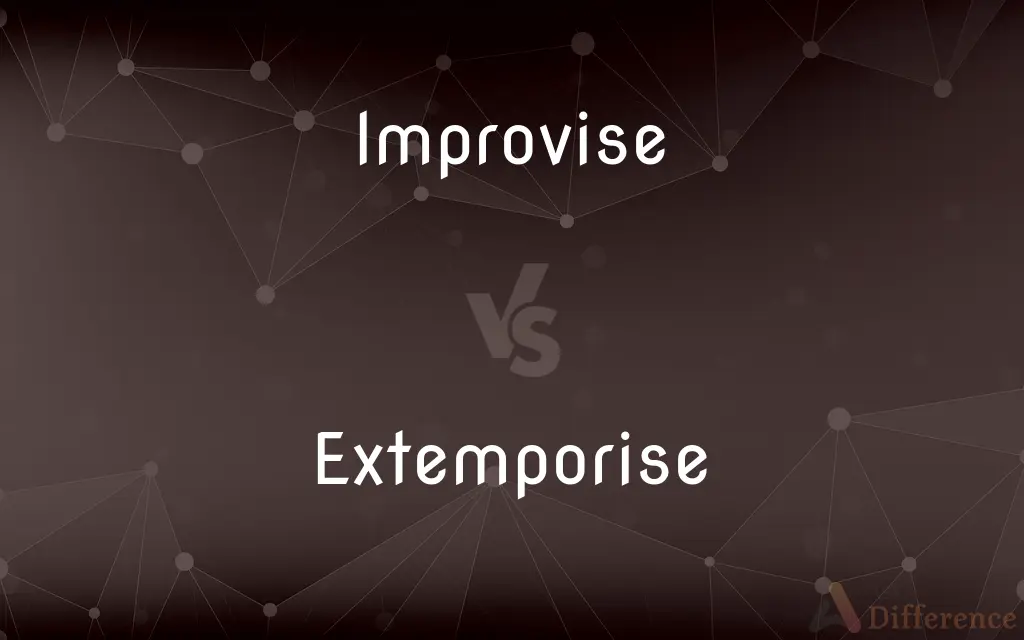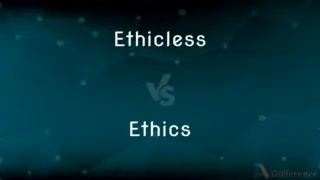Improvise vs. Extemporise — What's the Difference?
By Urooj Arif & Maham Liaqat — Updated on April 24, 2024
Improvisation involves spontaneous creativity without prior planning, often in arts; extemporisation also denotes unprepped performance but typically highlights speech or rhetoric.

Difference Between Improvise and Extemporise
Table of Contents
ADVERTISEMENT
Key Differences
Improvisation is a broad term that applies to spontaneous creativity in various fields such as music, theater, and dance, focusing on creating something new without any pre-planned scripts or arrangements. Whereas extemporisation is specifically used to describe the act of speaking or performing without preparation, often emphasizing the ability to adapt quickly to the spoken content.
In improvisation, participants rely on their instincts and real-time reactions to create or perform, which encourages unique and unpredictable outcomes. On the other hand, extemporisation, while also unscripted, often involves a deeper reliance on one's immediate knowledge and rhetorical skills, particularly in public speaking or debates.
Improvisation is celebrated for its artistic value and is often used in settings where expression and originality are paramount. In contrast, extemporisation is frequently associated with academic, professional, or political environments where the speaker must articulate thoughts clearly and persuasively on the spot.
Many training programs in arts schools include improvisation to enhance creativity and spontaneity among students. Conversely, extemporisation is typically honed through practice in speech and debate clubs or in professional development courses focusing on public speaking.
Improvisation can sometimes lead to the development of entirely new works or ideas that can influence future artistic directions. Extemporisation, while also creative, is generally more focused on effectively conveying existing ideas or responding to immediate questions or challenges.
ADVERTISEMENT
Comparison Chart
Definition
Spontaneous creation without preplanning
Speaking or performing without prior preparation
Typical Uses
Arts (music, theater, dance)
Speech, public speaking
Skills Emphasized
Creativity, spontaneity
Rhetoric, quick thinking
Outcome
New artistic expressions or ideas
Effective communication of ideas
Training Environments
Arts schools, creative workshops
Speech and debate clubs, professional seminars
Compare with Definitions
Improvise
Making do with the tools at hand to solve a problem.
Without a proper mixer, he improvised by using a fork.
Extemporise
The skill of speaking without prior preparation.
His extemporisation during the debate won him the competition.
Improvise
The act of inventing something spontaneously.
He impressed the audience with his ability to improvise a song on the spot.
Extemporise
Ad-libbing in a speech or presentation.
Faced with a missing slide, she had to extemporise the rest of her presentation.
Improvise
Adapting to new conditions using available resources.
Lost in the woods, she had to improvise a shelter from branches.
Extemporise
Making up content or remarks on the fly.
Good teachers can extemporise explanations to suit student questions.
Improvise
Creating or performing music without any preparation.
Jazz musicians often improvise during live performances.
Extemporise
A method of delivering spontaneous speech effectively.
Extemporisation is essential for successful public speaking.
Improvise
A performance technique emphasizing spontaneous creative processes.
The theater group specializes in improvisation to create dynamic scenes.
Extemporise
Rapid response with little to no planning in rhetoric.
Politicians often have to extemporise answers during press interviews.
Improvise
To make, compose, or perform with little or no preparation
Improvise a solution to the problem.
Improvise variations on a melody.
Extemporise
(intransitive) To do something, particularly to perform or speak, without prior planning or thought; to act in an impromptu manner; to improvise.
Improvise
To make or provide from available materials
Improvised a dinner from what I found in the refrigerator.
Extemporise
(intransitive) To do something in a makeshift way.
Improvise
To make, compose, or perform something extemporaneously.
Extemporise
(transitive) To make or create ex tempore.
Improvise
To make do with whatever materials are at hand
There isn't much in the cabin. We'll just have to improvise.
Extemporise
To compose extemporaneously or improvise.
Improvise
To make something up or invent it as one goes on; to proceed guided only by imagination, intuition, and guesswork rather than by a careful plan.
He had no speech prepared, so he improvised.
They improvised a simple shelter with branches and the rope they were carrying.
She improvised a lovely solo.
Extemporise
Perform without preparation;
He extemporized a speech at the wedding
Improvise
To compose, recite, or sing extemporaneously, especially in verse; to extemporize; also, to play upon an instrument, or to act, extemporaneously.
Improvise
To bring about, arrange, do, or make, immediately or on short notice, without previous preparation and with no known precedent as a guide.
Charles attempted to improvise a peace.
Improvise
To invent, or provide, offhand, or on the spur of the moment; as, he improvised a hammer out of a stone.
Improvise
To produce or render extemporaneous compositions, especially in verse or in music, without previous preparation; hence, to do anything offhand.
Improvise
Perform without preparation;
He extemporized a speech at the wedding
Improvise
Manage in a makeshift way; do with whatever is at hand;
After the hurricane destroyed our house, we had to improvise for weeks
Common Curiosities
What is the primary difference between improvisation and extemporisation?
Improvisation broadly refers to creating spontaneously across various arts, while extemporisation is specifically unprepared speech or performance.
What are typical settings where extemporisation is important?
Academic, professional, and political settings where impromptu speaking is required.
Can improvisation lead to established artistic works?
Yes, many improvised sessions can lead to the creation of recognized works in music and theatre.
How do artists use improvisation?
Artists use improvisation to generate new ideas and expressions during performances.
What makes a good extemporiser in public speaking?
Quick thinking, a good command of language, and the ability to organize thoughts swiftly.
Why is improvisation valued in the arts?
It fosters originality and a deep, intuitive connection with the art form.
Is extemporisation only applicable to speech?
Primarily, though it can also refer to any performance given without prior preparation.
Can improvisation be learned and practiced?
Yes, improvisation can be enhanced through practice, particularly in artistic disciplines.
Is it possible to combine both improvisation and extemporisation?
Yes, many effective communicators blend both skills for dynamic and engaging delivery.
Which skills does improvisation develop?
Improvisation develops creativity, spontaneity, and the ability to adapt.
How does one prepare for extemporisation?
Through practice, acquiring broad knowledge, and developing quick-thinking skills.
What are the risks of extemporisation in professional settings?
It may lead to inaccuracies or less polished presentations if not well-handled.
What tools can help improve extemporisation?
Regular practice, participation in debates, and familiarity with a wide range of topics.
How do improvisation skills benefit everyday life?
They enhance problem-solving abilities and adaptability in unpredictable situations.
Does extemporisation require previous knowledge?
Yes, it often relies on the individual's existing knowledge and experience.
Share Your Discovery

Previous Comparison
Ethicless vs. Ethics
Next Comparison
Naughty vs. BadAuthor Spotlight
Written by
Urooj ArifUrooj is a skilled content writer at Ask Difference, known for her exceptional ability to simplify complex topics into engaging and informative content. With a passion for research and a flair for clear, concise writing, she consistently delivers articles that resonate with our diverse audience.
Co-written by
Maham Liaqat













































